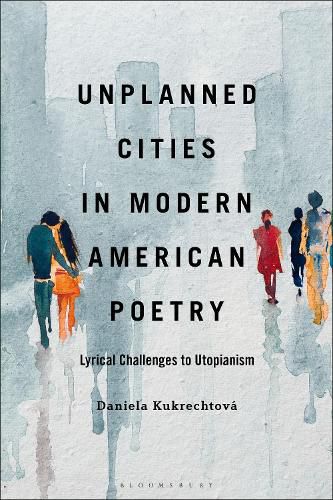Readings Newsletter
Become a Readings Member to make your shopping experience even easier.
Sign in or sign up for free!
You’re not far away from qualifying for FREE standard shipping within Australia
You’ve qualified for FREE standard shipping within Australia
The cart is loading…






Reveals how five modern American poets challenged prevailing discourses about urbanization through lyrical representations of cities and the diverse people who lived in them.
In early 20th-century America, industrialization and the influx of immigrants and rural migrants into urban centers fostered a certain representation of and distaste for cities and their inhabitants. The dominant discourse was one of containment through utopian planning and violent reshaping, often reflected in both policy-making and writings about cities during this time. Yet as Daniela Kukrechtova identifies, urban literature also reveals voices that challenged that narrative.
Unplanned Cities in Modern American Poetry shows how the formally innovative works of five poets - Jean Toomer, William Carlos Williams, Hart Crane, Frank O'Hara, and Gwendolyn Brooks - worked against anti-urban discourse. Their works displayed a love for disorderly cityscapes and the actual urbanites who inhabit them, promoting the radical idea that cities were for people while revealing the extreme dystopian/utopian discourses that helped create and maintain divisions and disparities.
Kukrechtova argues that, besides offering a radical critique, these poets also used their poetry to imagine the mental and emotional attitudes of urban dwellers toward their environment. She therefore offers the urban ecocritical approach often missing in literary analyses of modern American poetry. Simultaneously, the lyrical and socially-engaged imagination in these works - that is, the human implications of various plans, designs, and policies that helped create the modern American city - represent a voice often unheard in urban studies and its history.
$9.00 standard shipping within Australia
FREE standard shipping within Australia for orders over $100.00
Express & International shipping calculated at checkout
Reveals how five modern American poets challenged prevailing discourses about urbanization through lyrical representations of cities and the diverse people who lived in them.
In early 20th-century America, industrialization and the influx of immigrants and rural migrants into urban centers fostered a certain representation of and distaste for cities and their inhabitants. The dominant discourse was one of containment through utopian planning and violent reshaping, often reflected in both policy-making and writings about cities during this time. Yet as Daniela Kukrechtova identifies, urban literature also reveals voices that challenged that narrative.
Unplanned Cities in Modern American Poetry shows how the formally innovative works of five poets - Jean Toomer, William Carlos Williams, Hart Crane, Frank O'Hara, and Gwendolyn Brooks - worked against anti-urban discourse. Their works displayed a love for disorderly cityscapes and the actual urbanites who inhabit them, promoting the radical idea that cities were for people while revealing the extreme dystopian/utopian discourses that helped create and maintain divisions and disparities.
Kukrechtova argues that, besides offering a radical critique, these poets also used their poetry to imagine the mental and emotional attitudes of urban dwellers toward their environment. She therefore offers the urban ecocritical approach often missing in literary analyses of modern American poetry. Simultaneously, the lyrical and socially-engaged imagination in these works - that is, the human implications of various plans, designs, and policies that helped create the modern American city - represent a voice often unheard in urban studies and its history.